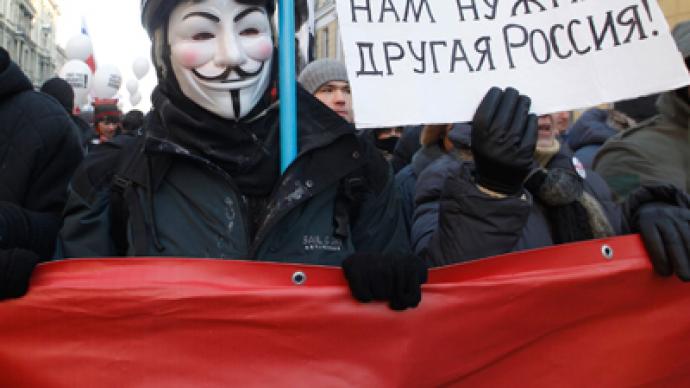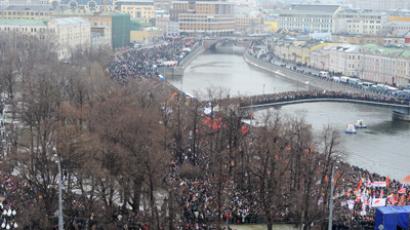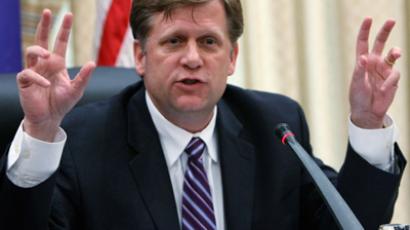Comparing Oranges…

Pro-Kremlin politicians and pundits explain the recent mass protests as an “Orange Revolution” conspiracy orchestrated by the West. Member of the Russian Public Chamber Nikolay Svanidze believes the allegations are a hoax to demonize the opposition.
In the article below, historian and analyst Nikolay Svanidze explains his view.
One of the wings of Russia’s political spectrum appears to be constantly dominated by hysteria, blaming every instance of public discontent on machinations by the US Department of State. A number of parties and politicians are back to the habit of spotting American spy games behind everything. This has become the favorite and most commonly-employed argument for those backing the Putin government, culminating in a pro-Putin rally at the Poklonnaya Hill memorial park on February 4, where speechmakers were getting out of breath stigmatizing “the Orange plague.” Sadly, the government itself eagerly relies on this type of supporters. Vladimir Putin, for one, has publicly endorsed the Poklonnaya Hill rally.Many pro-government pundits and observers have rushed to announce “a change of tide,” claiming that pro-government rallies are attracting several times more people than opposition protests. However, that is an acute case of wishful thinking. It is common notion in Russia that official appraisals of rallies’ strength are notoriously biased, overstating the turnout at pro-government events and downplaying protest attendance numbers several times over. In fact, the word “opposition” is not really legitimate in this context, as the rallies that attracted tens of thousands of people in Moscow and other cities last December and last week were mainly attended by regular citizens who feel that the existing system of governance deprives them of their civil and political rights. It was after Prime Minister Putin denounced the protests and their participants using his rather characteristic choice of derogatory speech that the protest movement indeed turned oppositional. Whereas the initial December protests merely demanded that Head of the Central Election Commission Vladimir Churov should resign on account of election fraud, Putin’s explicit contempt for the discontented made him the prime target of public scorn. As for the two simultaneous and directly antagonistic rallies that took place in Moscow on 4 February 2012, they are hardly comparable. While both events were attended by upwards of 100,000 people each, there was a striking difference as regards content. While the opposition protest that re-assembled at Bolotnaya Square on February 4 had its clearly defined messages and demands, the pro-government rally at Poklonnaya Hill had but one purpose: to “stick it” to the Bolotnaya crowd. The Poklonnaya meeting was merely a reaction to the Bolotnaya protests, its speakers and slogans being evidently focused on pinning an “Orange Revolution” accusation on the protest movement. Another thing that revealed how these two events were a world apart was organization. Those at Bolotnaya Square came by their own free will, every activist and organizer being a volunteer. Of the thousands who made up the crowd at Poklonnaya Hill, the majority were either paid to show up or intimidated into participation by their employers or other authorities. I would not rule out that there were also people who came to the memorial park out of their sincere confidence in Vladimir Putin, but numerous reports and revelations show that the rally owed its formidable numbers to administrative mobilization – and none of the official rebuttals have so far effectively proved the opposite. I have to give credit to the Kremlin’s own political consultants, though: staging street action to juxtapose it to an opposition rally was tactically a smart idea. However, strategically it is a terribly hazardous gamble, for you effectively pit one part of the populace against another. Presenting political opposition as a bunch of unpatriotic upper-middle class rascals who deserve to be stomped upon by the good common folk is not only dirty, but also suicidal. In whipping up hysteria over a fictional revolution, you risk instigating a very real civil war. In a highly stratified and diverse society such as Russia, the Kremlin’s current divide-and-conquer tactics may turn out to be a Pandora’s Box. But back to the notorious “Orange Revolution” speculation. Fingering the world’s biggest and most ambitious power as the mastermind behind all things evil has repeatedly proved a highly efficient argument among a certain share of Russian society used to the Cold War-era reality of the United States being our country’s principal adversary. Not to mention the perennial trick of finding a foreign enemy to blame for domestic policy failures. But let us take a sober look at the global chess board. Is Russia challenging the US to global supremacy? Have we been gearing up for war with America? Do they have a reason to perceive us as a threat to be neutralized? If not, then why on Earth would the Americans, tied up as they are with an unwinnable war, a severe economic downturn and social unrest at home, commit so much effort to overthrowing a Russian leader whose trumpeted “opposition” to them has been little more than rhetoric? A popular argument in favor of the “Orange conspiracy” theory is the Ukrainian experience. While American influence is admittedly presumed behind the Kiev street protests that propelled a pro-Western government into power in 2004, the political situation in today’s Russia is only superficially comparable to that in Ukraine seven years back, while its is crucially different in essence. In similarity to several post-Soviet states, there is a powerful anti-Russian sentiment in Ukraine that can be played as a mighty trump card by anyone who wants to rally support for their agenda or political ambition – which is exactly what the Ukrainian liberal opposition did. In Russia’s case, it is not the opposition stirring enmity against a fictional foreign nemesis to impress the public, is it? Secondly, whereas both Ukraine and Georgia had distinct liberal-posterboy politicians who enjoyed wide popularity as well as good standing with Western embassies, there is presently NOT A SINGLE liberal politician in Russia who could boast any significant public support. Each and every liberal politician in this country is notoriously mistrusted and scorned, and even the recent multi-thousand-strong street protests explicitly positioned themselves as a no-leader movement. Should the White House indeed entertain a notion of spinning a protégé into presidency in Russia, which personality could they possibly spin?Finally, the liberals in the United States might indeed be happy with the prospect of having a more like-minded, liberal administration in Moscow to deal with. But what are the odds of such a liberal-democratic government seizing and keeping power through a revolution in a country like Russia? Meanwhile, the prospect of raging chaos and a civil war in a country armed with nuclear missiles… If you think the Americans want us to have a revolution, you must be seriously underestimating their wit for self-preservation.
Nikolay Svanidze, special to RT
The statements, views and opinions expressed in this article are those of the author and do not necessarily represent those of RT.














